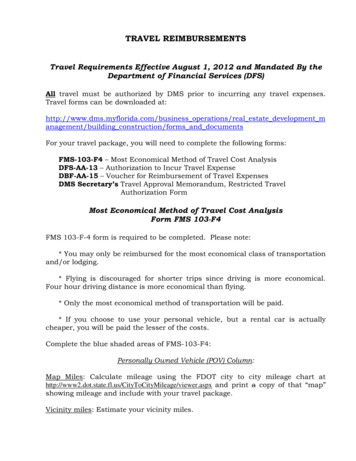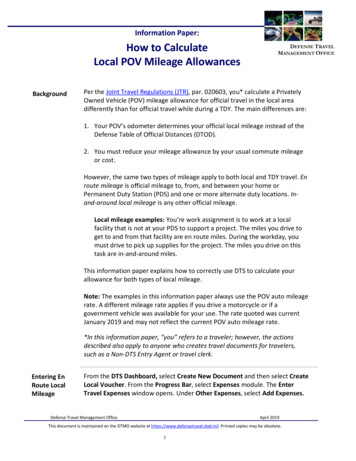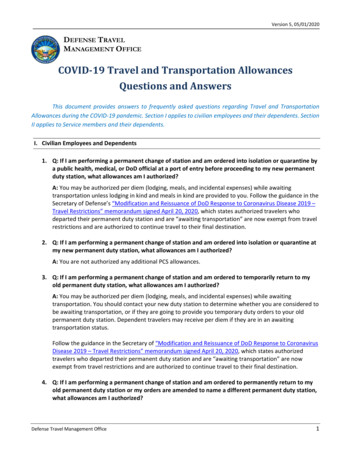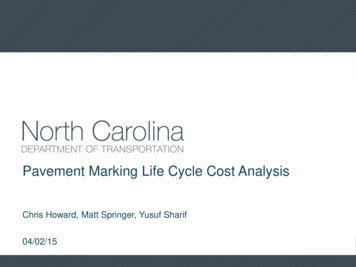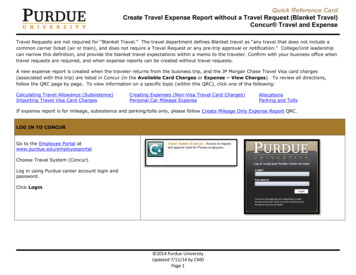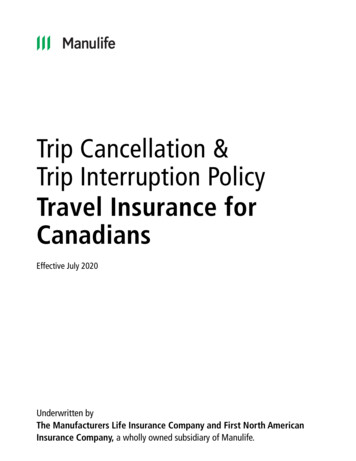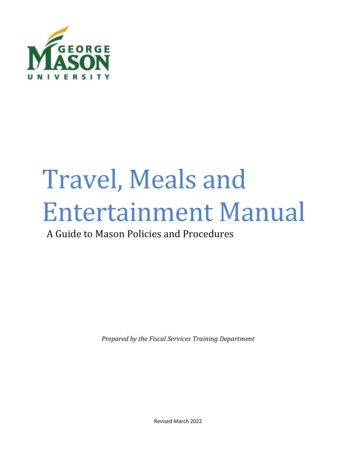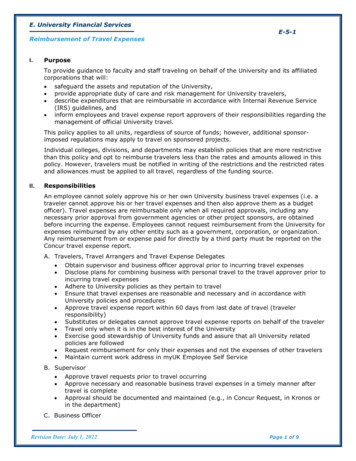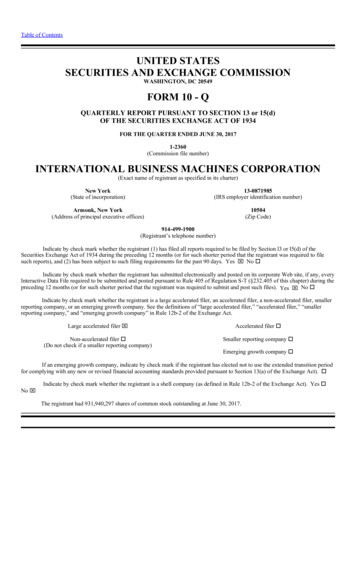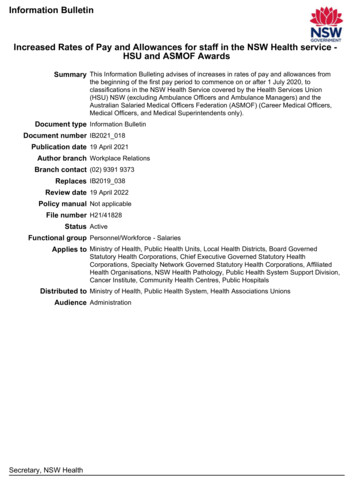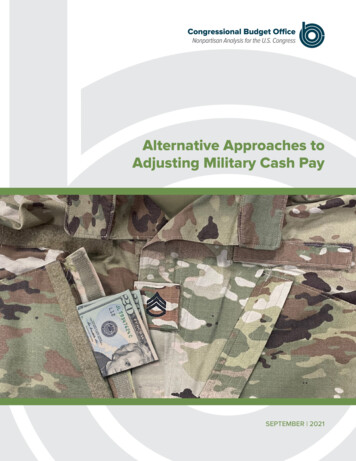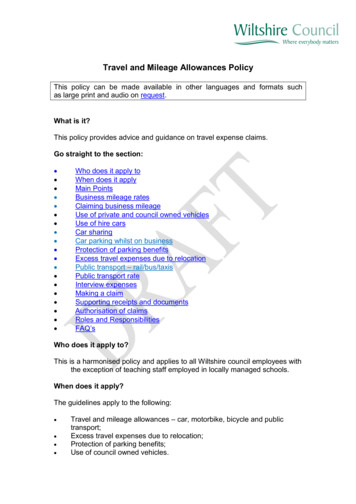
Transcription
Travel and Mileage Allowances PolicyThis policy can be made available in other languages and formats suchas large print and audio on request.What is it?This policy provides advice and guidance on travel expense claims.Go straight to the section: Who does it apply toWhen does it applyMain PointsBusiness mileage ratesClaiming business mileageUse of private and council owned vehiclesUse of hire carsCar sharingCar parking whilst on businessProtection of parking benefitsExcess travel expenses due to relocationPublic transport – rail/bus/taxisPublic transport rateInterview expensesMaking a claimSupporting receipts and documentsAuthorisation of claimsRoles and ResponsibilitiesFAQ’sWho does it apply to?This is a harmonised policy and applies to all Wiltshire council employees withthe exception of teaching staff employed in locally managed schools.When does it apply?The guidelines apply to the following: Travel and mileage allowances – car, motorbike, bicycle and publictransport;Excess travel expenses due to relocation;Protection of parking benefits;Use of council owned vehicles.
Main pointsBusiness Mileage rates1.You are entitled to claim a mileage allowance for any business milesundertaken for Wiltshire Council. The table below contains the mileageallowances payable;First 10,000 milesFollowing een Car SalaryPlease refer to the HRMC website for currentadvisory fuel rates.Sacrifice SchemeFigures are based on business miles undertaken in the tax year (April toMarch)2.In addition, you may be able to get tax relief for business mileage if youuse your own vehicle for work. (It can be a car, van, motorcycle orcycle.) Please refer to the guidelines on tax relief on business mileage,which include details of how to contact HMRC.Claimin business mileage3.You can only claim business mileage for any miles undertaken ‘on thejob’ as opposed to ‘to the job’. The ordinary commute to work is notcovered. See guidance for examples.4.All employees have a work base. Your work base is classed as whereyou go to attend meetings, even if infrequently, for example: teammeetings, training, appraisals, 1-2-1’s. This applies even if you areclassed as a home worker, and your work base will be designated byyour manager. See Guidance for examples.5.If your business journey starts from or goes directly past your work base,you must only claim business mileage from the work base and deductyour normal commute.6.If you are undertaking a journey which is completely different from yournormal commute to work and does not go directly past your work baseyou can claim business mileage, from home, for the whole journey.7.Business mileage claims are for the shortest reasonable route. TheRAC Route planner, via SAP ESS, can be used to give recommendedroutes. Claims for excessive mileage will be not be processed withoutsufficient explanation.
Use of private or council owned vehicles8.If you are driving on behalf of the council, using either a council orprivately owned vehicle, you must comply with the driving at work policy.9.If you cycle to council meetings or on council business, your bicycleshould be roadworthy and you should wear appropriate high visibilityclothing and a helmet. Distances should be ‘reasonable’ in terms of timeand cost.Use of a pool or hire car10. Where it is cheaper to hire a car rather than pay travel expenses for yourown car your manager may instruct you to use a council pool car.or ahire car.Car Sharing12. Wiltshire Council encourages you to share transport when attendingbusiness meetings. The driver of the vehicle can claim an additionalpassenger rate of 1p per mile.Car parking whilst on business13. Car parking expenses will only be refunded if you provide the relevantparking tickets. Parking penalties/fines will not be reimbursed as it isyour responsibility to ensure the correct ticket price is paid. Only officialparking expenses will be paid.Protection of parking benefits (nil detriment)Note: This is a temporary arrangement pending the introduction of the newharmonised car parking policy14. You should not be financially worse off due to a change in your parkingarrangements if you move job due to: the move to the unitary council; ora departmental restructure.Please refer to the Protection of parking benefits policyExcess travel expenses due to relocation
Note: This section is only applicable if you were in receipt of excess travelexpense prior to 1st September 2011. Refer to the excess travelexpenses due to relocation policy.15. Excess mileage can only be claimed for 3 years from the date of thework base change.16. Excess travel can be claimed for the difference between your home andold contracted work base, and your home and new contracted work baseif it exceeds 3 miles, or more.17. The applicable mileage rates are listed in section 1 above.Public Transport18. Rail travel should be 2nd class. 1st class tickets will not be reimbursed.Please follow the council’s procedure on The Wire for ticket purchases.19. Taxis will not be reimbursed unless there is a genuine reason for theiruse. E.g. Where an employee is put at risk due to early morning or latenight travel following attendance of a course, where no public transportis available, or where there are accessibility issues and reasonableadjustments are required for disabled employees. This will need to beagreed in advance by your manager.20. Bus/coach travel is reimbursed at cost.Interview Expenses21. Interview travel expenses will be paid at HMRC rates where criteria aremet. Please refer to the recruitment section on HR Direct.Making a claim for mileage expenses22. Claims should be made through SAP. If you do not have access to SAPa completed expenses form with relevant documentation must besubmitted for authorisation by your manager.23. Expense forms can be found on HR Direct or if you do not have accessto a PC your manager can provide you with one.24. Claims should be made monthly. Claims must be made within 3 monthsof the travel date otherwise your claim will not be processed.Supporting receipts and documents
25. All expense claims require you to provide original receipts, parkingtickets and documentation; otherwise the claim will not be processed.After submitting your expense claims on SAP, you will need to completethe Employee Self Service (ESS) travel claim receipts form, whichshould be returned to your line manager for them to sign. They shouldthen be sent to HR and payroll administration with the receipts for yourexpenses attached (please staple).26. It is your authorising manager’s responsibility to check off receipts andsupporting documentation before authorising your claim.27. All fuel expense claims, (hire car, Wiltshire Council owned vehicle oryour own car) will only be processed if the claim is accompanied by aVAT receipt. You will need to ask for a VAT receipt when paying – this isreadily available on request and includes a breakdown of VAT paid. Fortax purposes, the receipt must predate the journey to support the claim.Authorisation of claims28. Claims submitted via SAP should be authorised in SAP by your managerby the 10th of the month in order to be included in that month’s pay.29. Paper claims must be submitted by the 1st of the month.Roles and responsibilitiesEmployee responsibilities30. Ensure all receipts and paperwork is processed with your expense claim.31. Provide accurate records and details for all claims.Line manager responsibilities32. Thoroughly checking claims - e.g. checking mileage not excessive andthat claims made from home do not go directly past the work base.33. Ensuring correct receipts accompany claims.34. Ensuring appropriate paperwork is passed to HR payroll administration.35. Ensure claims submitted via SAP are authorised within the system bythe 10th of the following month to be included in that month’s pay.36. Complete all fields within SAP to maintain an audit trail.37. If a claim is not authorised you will need to inform the employee and letthem know why so they can amend and re-submit the claim.
38. Discussing appropriate travel arrangements with staff to make best useof the working day without building up unnecessary additional hours,through travel to early or late meetings.HR responsibilities39. Ensure receipts and documentation are correctly filed/stored to ensurethat claims can be retraced if required.Frequently asked questions40. I now have a car from the Green Car Salary Sacrifice Scheme. Whatbusiness mileage rate can I claim?This rate is governed by the HMRC and your car is classed as acompany car. The rates are updated regularly and depend on the type offuel your car uses and the engine size. For the current rates pleaserefer to the HMRC website.41. I claim excess travel expenses as my work base was moved fromCounty Hall to Shurnhold. If I travel from home to a meeting at adifferent site, can I still make a claim for excess travel?If you are travelling from your home to the alternative site, and you arenot going past your work base (original or current) you can claim thewhole journey as business mileage.E.g. an employee lives in Trowbridge and used to work in County Hall,but now has to travel to Shurnhold. Their journey to work used to be 2miles each way. As Melksham is 7 miles away, they can claim 5 milesexcess travel each way. The same employee has a meeting inWestbury and they want to travel there directly from home. This isbusiness mileage so they can claim expenses for the whole journey. Ifhowever a journey had passed Shurnhold, business mileage could onlybe claimed from Shurnhold to the destination. You would only claimexcess mileage for the commute from County Hall to Shurnhold asnormal.42. I sometimes work from home and go to meetings from there. Wheredo I claim business mileage from, my home or work base?If your meeting involves a journey which is completely different from yournormal commute to work, you can claim business mileage from homeand back again.If you are returning to your office base after the meeting, you can claimfor the return journey. However, if your journey back to your work basemeans you pass within 1 mile of your home address and/or forms part ofyour normal commute you should deduct that part of the journey fromyour claim.43. I overstayed in a car park because my work meeting went on longerthan expected. Will the council pay for my parking fine?
No, this policy only covers legal parking charges. The council will notpick up the cost for penalty notices occurred for illegal parking.44. I was entitled to free parking at my previous work base but now myjob has moved I walk to work – can I still claim for the parking Iwould pay if I brought my car to work?No, this policy is on the basis on “nil detriment”. This means that youshould not be financially worse off as a result of your move. If you arenot suffering any financial loss by walking to work then you are notentitled to claim anything.45. What are the tax implications for business mileage?Inland Revenue rates for cars and motorbike are subject to tax, howeverthe bicycle rate is not an Inland Revenue rate and is therefore nontaxable.46. Will excess mileage due to moving to Shurnhold be taxed? Ithought that mileage paid due to temporary moves is not taxable.Yes - you will pay tax and NI on any excess mileage claimed. TheHMRC has a very complicated definition of what can (and cannot) becalled a "temporary" workplace. We have looked into this very carefullyand unfortunately the Shurnhold move does not fall under this definitionand therefore this mileage is not tax-exempt.47. Can I claim for excess mileage if I cycle to work?Yes - please make sure you clearly mark on the claim form that you areusing a bicycle so that the appropriate rate can be paid.48. Due to my disability I do not drive but have a support worker whodrives my vehicle. Does this policy apply to me?Yes this policy is applicable; however you will be responsible forensuring your driver holds a current driving licence and is insured todrive your car.49. I have to attend regular training sessions as part of my role.Sometimes I need to go to a different hub for the training, as I amunable to attend the sessions available at my normal work base.Am I able to claim travel expenses?Where possible, for cost effectiveness, you should attend training at yournormal work base. If this is not possible you should discuss with yourmanager whether they are happy for you attend an alternative locationand to authorise the travel claim.50. I work in I.T. and as part of my role I have on call duties. Can I claimtravel expenses when I am called back into work on the same day?No, because this is a requirement of your role, the journey is classed asordinary commuting and no business mileage can be claimed.
51. There is an on call element to my role which means that outside ofmy normal working hours I may be called to locations other thanmy normal workplace. If I have been in to work and done mynormal commute, can I claim for the mileage done visiting the otherlocations?Yes, you can claim for the additional miles that are not part of yournormal daily commute.52. I am a key holder for a leisure centre and on rare occasions I mayneed to attend the building after my normal working hours havefinished (e.g. if an alarm goes off). Can I claim for the additionaltravel?As this is part of your normal commute and part of your role, you will notbe able to claim the mileage. You should refer to your contract ofemployment regarding your eligibility to claim an overtime payment.53. Members of my team sometimes catch a train to training courses ormeetings at other hubs, E.g. Salisbury or Chippenham. They get aticket from their nearest railway station, and this may be nearerthan their work base. Should they travel by car/pool car instead?Each employee may have different circumstances in terms of transportused in their daily commute. Some may cycle to work, use publictransport or not have a car available to them.There may be occasions where it makes more sense for a team memberto travel directly by train, particularly if the event is first thing or furtherafield. In these circumstances it is the responsibility of the manager todiscuss such travel arrangements in context, and agree the most costand time effective option.54. I live out of county and I am asked to attend a course which is alsoout of county. I intend to travel from my home to the course by trainas it is much quicker and the course starts at 8.30am. If I was todrive I would have to leave much earlier and pay for all day parking.Can I claim for the train fare?Yes, however you will need to discuss the options with your manager.They will need to consider not just the overall financial costs, but also thetime, when considering the claim. The aim of the policy is to ensure thatthe most cost and time effective modes of transport are used.55. If I have to attend an early meeting at a location which is furtherthan my normal commute, I will have to leave home earlier thannormal to get there on time. Can I class this time as additionalhours/Flexi/TOIL?Yes, you can claim for the time over your normal working day as you aregoing to a different location. So, for example, if you normally start workat 8.00 and leave home at 7.30, and on such an occasion you need toleave at 7.00 to attend a course or meeting somewhere else, you wouldclaim the additional 30 minutes. However, if this is a regular occurrence,
your manager will highlight that appointments should be arranged tomake best use of your working hours to avoid unnecessary costs,including the buildup of additional hours.56. My manager has asked me to attend a course in London whichstarts at 9.00am and finishes at 5.00pm. I will need to leave homeat 6.00am to get there on time and will not get home until 8.00pm.Can I claim the additional time back?If your manager has asked you to attend a course which is longer thatyour normal working day, you should agree beforehand how the timeshould be recouped. E.g. Flexitime, TOIL or overtime. Please refer to theflexitime policy.57. What is the public transport rate and what do I claim it for?The public transport rate has now been removed. All business mileage isnow paid at the current HMRC rate.58. Should any mileage claimed be rounded up or down? E.g. In total Ihave done 12.9 miles. Does this get rounded down to 12 miles or upto 13 miles?For all claims you should round up if the journey is .5 miles and above,and down if .49 miles or below.For example: A journey of 2.4 miles is rounded down to 2 miles, and ajourney of 5.8 miles is rounded up to 6 miles.DefinitionsHome Worker – an employee who is defined as a home worker in theirContract of Employment. A council office work base should still be defined.Flexible Working – the ability to work flexibly, including working from home,where your contracted work base is a council office. E.g. You are able towork from home up to 2 days per week but your main workplace is a counciloffice.Business journey – any journey made during the course of the working dayfor work purposes which includes, but is not limited to, dropping off orcollecting people/items to other departments(even if it is at the beginning orend of the working day) and going to a meeting/training at another site otherthan your usual place of work.Equal OpportunitiesThis policy has been Equality Impact Assessed (link to EIA for policy) toidentify opportunities to promote equality and mitigate any negative or adverseimpacts on particular groups.
Managers will make any necessary adjustments to ensure that all employeesare treated fairly. For further information see the guidance on equalopportunities in (link to equal opps guidance)LegislationThis policy has been reviewed by the legal department to ensure compliancewith our statutory duties.This policy has also been reviewed by our independent tax specialists toensure compliance with HMRC guidelines.Advice and guidanceIf you require help in understanding this policy you should contact your linemanager or trade union representative if you are a member.If, due to the nature of your query, it is not appropriate to contact your linemanager you should contact your head of service who will nominate anappropriate manager or colleague to help you.Further informationThere are a number of related policies and procedures that you should beaware of including: Driving at WorkPool car bookingTravel and commutingFor further information please speak to your supervisor, manager, servicedirector or contact your HR Case Adviser.Policy authorPolicy implementedPolicy last updatedHR Policy and Reward Team – (RW)DD-MM-YYYY14-08-2012
Use of a pool or hire car 10. Where it is cheaper to hire a car rather than pay travel expenses for your own car your manager may instruct you to use a council pool car.or a hire car. Car Sharing 12. Wiltshire Council encourages you to share transport when attending business meetings. The driver of the vehicle can claim an additional
